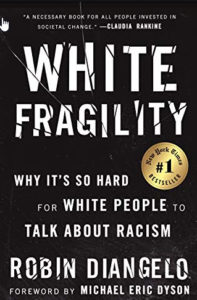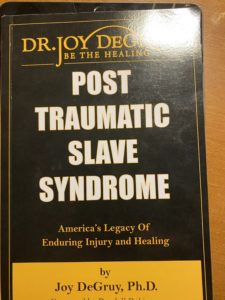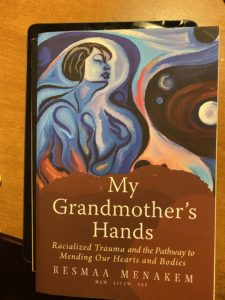On May 5 Rev. David Brown, a diversity advisor at Temple University held a public conversation about the themes of my book Disrupting Whiteness. The event was sponsored by the Inside-Out Prison- Exchange program, which brings together traditional undergraduate college students and incarcerated men and women in a college course. Following the conversation there were a number of questions raised, some of which we were able to address, but many we were not. Over the next several weeks I would like to address these questions.
For those who would like to view the entire conversation, it can be found at https://www.facebook.com/theinsideoutcenter/videos/756890645187518
Question: Are you concerned that your work can be perceived as needing to coddle white racists so they feel comfortable discussing race? How do we balance the desire to be sensitive to white people’s feelings so that they are willing to engage in critical conversations about race while also not playing into white fragility?
 When I began working on Disrupting Whiteness, one of my concerns was that I would be perceived as going soft on white people, as the questioner suggests “needing to coddle white racists so they feel comfortable discussing race.” A similar criticism has sometimes been made of Robin DiAngelo;s concept of “white fragility.” Critics suggest that by naming whites as “fragile” she is somehow asking us to go easy on white folks so as not to break their delicate little selves. However, I can’t believe anyone reading her book could honestly suggest she is going easy on white folks. Nor am I.
When I began working on Disrupting Whiteness, one of my concerns was that I would be perceived as going soft on white people, as the questioner suggests “needing to coddle white racists so they feel comfortable discussing race.” A similar criticism has sometimes been made of Robin DiAngelo;s concept of “white fragility.” Critics suggest that by naming whites as “fragile” she is somehow asking us to go easy on white folks so as not to break their delicate little selves. However, I can’t believe anyone reading her book could honestly suggest she is going easy on white folks. Nor am I.
I wrote Disrupting Whiteness after nearly twenty years of engaging students in conversations on racism and a previous 15 years as a pastor trying to involve my predominantly white congregations in addressing issues of racism in their communities and the nation at-large. From my experience, including my own journey as a young person growing up in suburban Minneapolis, I have realized that the topics of race and racism are deeply disturbing to most of the white people I know. I have witnessed how quickly white folks will change the topic when racism is brought up. DiAngelo calls this pattern “white solidarity …the unspoken agreement among whites to protect white advantage and not cause another white person racial discomfort.” Now I would guess this idea of white solidarity seems strange to BIPOC who are racialized by our society whether they like it or not. By contrast for whites race-based issues are deeply unsettling, unnerving and stir up all sorts of negative emotions like guilt, shame, anger, fear and hatred. And because our society is founded on the principles of white supremacy, white people have been allowed to get away with avoiding, minimizing and denying the realities of racism. I am saying we can’t let that happen anymore. I am calling upon whites and BIPOC who care about these issues and who have white friends and colleagues in their social networks, to take the bold step of introducing the topic of race and racism into the conversation, whether folks like it or not.
But then, I suggest we go further. When the other person expresses guilt or fear or anger or denial, I propose we ask them to explain how they came to feel or think as they do. I encourage us to ask the other person to tell their story. Rather than telling someone they are wrong for feeling as they do (because feelings aren’t right or wrong, they just are), I invite us to engage the whites in our lives in a conversation that encourages them to reflect on why they think and feel as they do. I want us to engage them in dialogue, and when the opportunity arises, I want us to share our stories as to how we came to abhor racism and how it degrades both the target of that racism as well as the one holding it. Both the hater and the hated are stigmatized by a system that divides, and degrades.
In 2005 Portland State University psychologist Dr. Joy DeGruy published her groundbreaking book, Post Traumatic Slave Syndrome, in which she documents how trauma experienced by African Americans under slavery, Jim Crow, lynching and the like, is actually transmitted to later generations through a process called epigenesis. The result of this process is that many African Americans have inherited the triggers and emotions related to trauma, even if they themselves have not been significantly traumatized. Other researchers looking at DeGruy’s findings realized there is a parallel process that happens to people cause other people trauma. Clinical psychologist Reema Menakem in his book My Grandmother’s Hands, says that intergenerational trauma seen in African Americans, also occurs in a different form in whites.
The clearest evidence of what Menakem calls “white-body supremacy trauma” is white fragility, that tendency for white people to regard even the most modest amount of racial stress as intolerable. Whites are emotionally, psychologically and spiritually handicapped by the historic racial trauma they have inherited, and are only able to hide from it because our culture strongly denies, minimizes and hides from the reality of racism in our history, as well as its ongoing impact in the present. As I have shared in previous weeks, this is why things like the 1619 Project and concepts like Critical Race Theory are so threatening; they are challenging whites to face the impact of racism in their lives, in their history and in American society in general.
 I will be the first one to admit that on one level there is nothing more satisfying than laying someone out for being a bigoted racist, making people shake and moving them to tears. One can feel like the ancient Biblical prophet blasting the powers-that-be for their hypocrisy and greed and degrading actions. However, if we are wanting people to change, I have found that the “holier -than-thou” approach is pretty ineffective in bringing about meaningful lasting change in people’s lives. Fear works to stifle people in the short term, but love, understanding, and persistent truth wins the day in long term.
I will be the first one to admit that on one level there is nothing more satisfying than laying someone out for being a bigoted racist, making people shake and moving them to tears. One can feel like the ancient Biblical prophet blasting the powers-that-be for their hypocrisy and greed and degrading actions. However, if we are wanting people to change, I have found that the “holier -than-thou” approach is pretty ineffective in bringing about meaningful lasting change in people’s lives. Fear works to stifle people in the short term, but love, understanding, and persistent truth wins the day in long term.
At least that is what I have chosen to believe and how I have chosen to live. I want the white people in my life to realize that at any time I may bring up racism into the conversation, and that I do so because I care about them, as well as the people whose lives are continually harmed and hindered by our racist society. I want them to feel a discomfort that suggests that maybe they need to change how they think and feel and live. I will admit it is also uncomfortable for me, but I believe it is part of the work we who call ourselves allies (or accomplices or co-conspirators) must do.


Hi, Drick,
I’m happy to see this post, especially in light of work that needs to be done in majority-white churches. I’m reading Disrupting Whiteness right now (highly recommended by a mutual friend). I would hope we white citizens might learn someday to be fragile in the right way. It’s time to let our lack of knowledge and expertise show. Especially to each other. It’s better than beating around the bush in a vain attempt to be ‘nice’ about what will never be nice, or pretending it doesn’t exist.
Elouise Renich Fraser
Drick,
I am wondering if you have considered some of the recent discourse surrounding the books you’ve mentioned. While critics agree that most of these books mean well and were written without ill intention, it’s simply not effective to read them without considering what people are saying recently – and this is constantly changing. For example, Ibram X. Kendi came out with criticism on DeGruy’s book in 2016 via an article on the African American Intellectual History Society (AAIHS) website. Presenting this discourse is vital to the ever-developing conversation surrounding these topics – 2005 is nearly 16 years ago! There have been many articles following Kendi’s – some agreeing, some disagreeing, and some attempting to reconcile both Kendi and DeGruy’s thoughts – all of which should be considered and dialogued about. Citing DeGruy’s publication without providing this discourse doesn’t allow the reader to consider that there are debates among scholars within the very material we reference.
Another example would be the recent criticism surrounding DeAngelo’s book as well, and the way she’s profited from it. This book was a bestseller in 2018, but in just 3 short years criticism has fostered conversations that expose the ugly underbelly of this ‘antiracist’ work and the way it’s been exploited for profit. If we are committed to doing better, I think it’s paramount to keep ourselves rooted in the present by considering all of the discourse that has followed these publications rather than holding them up as a standard to grow from. It does not matter how long a plant grows in bad soil, it will eventually suffer and die, or at least live its life struggling to achieve its goal of growth. Make sure the space you are planting your ideas in will support growth. Evaluate the soil, year after year, because things change, and if you want growth to continue – sometimes the plant needs to be uprooted and placed in new soil.
Thank you for your consideration!
Lea – Thank you for your substantive suggestions. I am aware of the criticism of DiAngelo’s work. There is a tension and paradox in that criticism. On the one hand, we need white scholars addressing these issues while remaining accountable to BIPOC individuals. I believe DiAngelo has done that and I appreciate her insights. On the other hand, when one becomes a sort of white anti-racist celebrity, there is something inherently questionable about that. I don’t know DiAngelo well enough to know how she deals with her “fame.” I know Tim Wise wrestles with the same issues. I think it is a question that must continually be raised. As for Kendi’s critique of DeGruy I will look that up. Thanks you for sharing. – Drick